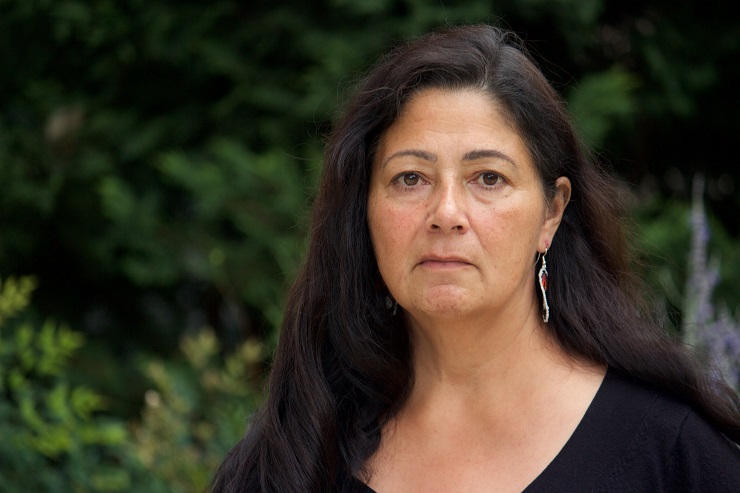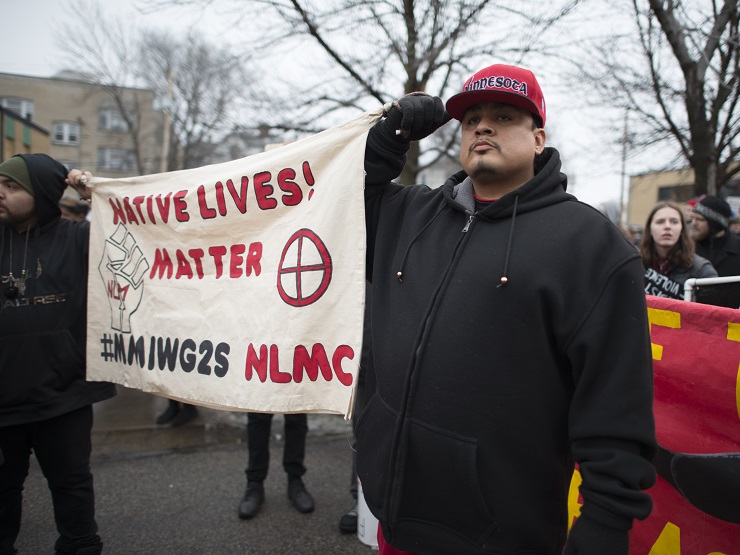
Denise Altvater Carl Roose / AFSC
Denise Altvater serves as Coordinator as the Wabanaki Youth Program in Maine. She has created a supportive web of connection and communication in a region where Native Communities have been isolated and abused. With her leadership, the American Friends Service Committee's Wabanaki Program (Maine) was instrumental in developing the first Truth and Reconciliation commission between a sovereign Tribal nation and a U.S. state and she recently has become focused on offering decolonization workshops for faith communities. Christina Elcock and Lucy Duncan open up a conversation with Denise to explore the importance of decolonization and why it’s vital in order to heal from the cracks and abuses of a dehumanizing system.
Christina Elcock: Can you elaborate on what decolonization means for you, what it means for Quakers and other people of faith?
Denise Altvater: Well, this one man got up in our most recent decolonization workshops, after we had presented all the material and done the timeline of colonization. We did an exercise where everybody got four slips of paper in the room and wrote down four things that meant the most to them in their lives. Then somebody went around and they had to give up one of those things to that person - and they did. Some of them were really hesitant and had a hard time giving up one of those slips of paper and so the next time around the person went and took one of those pieces of papers away from them. What that represented was, "This is what Native people went through. This is the losses that they experienced.”
Christina: Wow, that's really powerful.
Denise: And then people had to talk about what it felt like to lose those things. For them it was real. Some of them became very emotional because some of them lost their family, some of them lost their faith, some of them lost their hope. We did an exploration of colonialism and we talked about understanding how decolonizing ourselves leads to considering what the deep impact of colonization was, all that people lost. We talked about the impact colonialism had on Native people and the benefits that continue to flow to white people to the detriment of Native people. Then we invited them to identify ways to counteract the taking of things and the impacts of colonialism. We talk about ways to counteract colonialism that are grounded in the teachings of their faith and some of the strategies of decolonization that individual faith leaders implement and explore in their faith communities.

It's a heavy responsibility we ask of them – the workshop is a real, deep experience for them. We really try to help them to discuss and explore the centuries of harmful impacts that colonialism has had on Native people and what role their individual church has played. You can imagine how hard that must be and then to acknowledge it through their work – it stirs up so many emotions because the harm done by the churches has been so devastating and it continues to this very day. We create a space where we honour their emotions while they are learning. We gather and explore the history and what our hope is.
What we share with them is that we want to repair the harm, we want to come to a deeper understanding and have deeper values within their faith traditions and hope that we can heal relationships between settlers and indigenous people. But we especially need to focus on indigenous people who are calling for a time of healing because the earth is suffering and people need to come together. However, before that can happen, before healing can occur, the truth has to be told and there's so much work around all us that has to be done. There are many ways we offer this truth telling: through videos, through presentations, through hand-outs, through the four slips exercise and other ways.
I do two pieces of work. My first piece is, what does healing look like to me? and my second piece is, how does colonialism still play a part on the reservation where we live? I talk about those two things and when I'm done it shifts the work people have done all day from their heads to their hearts.
One man was sitting in the back, he didn't come into the circle, he was kind of separated from the group and we were a little unsure of where he was at, if he was really invested and how much he was taking in. We had a table where we had asked everybody to bring something that was really close to them and to put it on the table and he didn't bring anything.
He'd been stone-faced the whole time. And he made me a little hesitant to talk because, you know, do you really want to talk when you think that somebody is really not interested in listening to you? That was sort of how I felt. He was kind of a big guy, he was white. When I was done talking about my own healing journey and the impacts of colonization on the reservation today, he started crying. He said that he'd been sitting in, listening and taking everything in the entire time and he was really understanding the material. He said he was taking notes and he knew he was going to go back to his congregation and he knew what he was going to say and how he was going to change how he talked to his congregation. He shared with us some things that he was going to do and he said, “it wasn’t until Denise spoke that I put down my pen and everything that I had learned moved from the top of my head deep into my heart and my soul. It was then that I knew that everything I was going to do and say had to changed.”
Lucy Duncan and Christina: Wow.

Denise: It can't just be about learning from visuals and from presenters and from workshops, it has to be from the heart. We talk about this work and we talk about decolonizing our hearts and minds. I remember when we did the Truth and Reconciliation process from the beginning, that's what we always said, that the process was a decolonization of the hearts and minds of Native people, because we needed to decolonize of our hearts and minds. It's what kept us going because that process, for us, was always about healing, it was never, ever about anything else. Even though we had to go through the process that everyone else wanted us to, it was always about the healing.
I think that's really an important piece that some people don't realize is really important in almost all the work that we try to do. I learned that in the beginning when we did the work on the Indian Child Welfare Act (ICWA); the white Department of Human Services (DHS) workers, knew the ICWA law that'd been in place since the 80s, but they didn't follow it. So when we did our training we got together and decided, "Hey, alright, we're supposed to train them about ICWA? Well, they already know it, what are we supposed to train them about?" The reason they weren’t implementing the law was because they didn’t feel like it.
In order for the deeper change to occur, what we needed to do was we need to change hearts and minds, so we needed to help them understand the spirit of the law. How do we do that? We get them to be moved spiritually, we get them to be moved through their hearts. So, we made a video and in the video myself and others talked about our experience of being taken from our homes and the impact of being put in white homes. This is what we used as a training tool and that's what got DHS workers to understand the importance of ICWA and the spirit of the law. It's what got them motivated to enforce and follow the law.
I learned from that work in 1999, that whatever work I do, this heart element has to be a part of it. It's not always easy to get people to understand that. They think that you just stand up and you write on a white piece of paper and you show a video and people are supposed to walk away, and yes, they have the knowledge, but do many people really, truly accept it? Do they really, truly, want to believe it? Do they really, truly want to go out and use it to change the world? Do they really, truly change anything in their hearts or their minds? You have got to answer that question. I don't think so. I think that for some people who are really, truly entrenched in their faith beliefs and believe in the importance and necessity of this work - yes, I think that's possible. Do I think it's possible for just the regular person that we're trying to reach and get onboard with that this stuff? No, I don't think that it works that way for many. Unless their hearts are engaged, there won’t be much change.
Related Post
Thinking about decolonization as Thanksgiving approaches: A conversation with Denise Altvater part 1
Healing does not require forgiveness: A conversation with Denise Altvater, part 3
Colonialism and late stage genocide: A conversation with Denise Altvater, part 4
Acknowledging the full truth of our past: a conversation with Denise Altvater part 5